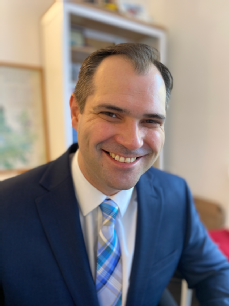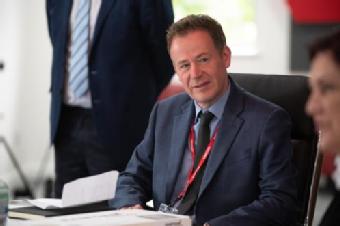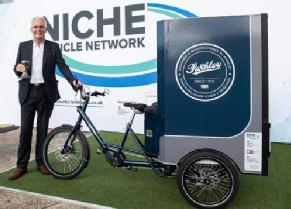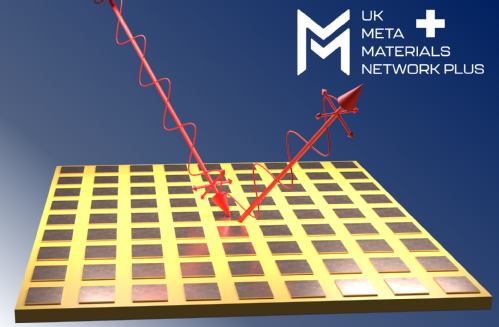WMG News - Latest news from WMG
Nurturing the STEM stars of tomorrow
The WMG Outreach team at University of Warwick was delighted to welcome a brand-new cohort of students for its Work Experience Week this summer (Monday 7 July to Friday 11 July). Launched in 2019, the annual event – which is organised by WMG Outreach and the University’s Widening Participation team – aims to foster inclusivity in engineering by giving students from under-represented backgrounds the chance to meet new people, learn new skills, and explore what a career in STEM could look like.
WMG partners with Tata Steel UK to advance green steel technologies
Academics at WMG, University of Warwick, have partnered with Tata Steel UK on a major new research initiative: Accelerating the Development of Automotive and Packaging steel Technology for Electric Arc Furnace production (ADAPT-EAF). The £7m project, which is backed by Tata Steel UK, WMG, Imperial College London, University of Cambridge, and the EPSRC Prosperity Partnerships programme, will develop a new generation of advanced steel products to transform the future of automotive and packing applications, from car bodies to food cans.
WMG drives green growth with new £13m EPSRC research hub
From developing greener materials and processes to growing more sustainable supply chains, a new £13.6 million research hub, funded by the Engineering and Physical Sciences Research Council (EPSRC), will help researchers at WMG at the University of Warwick, tackle some of the UK’s biggest manufacturing challenges.
The new Manufacturing Research Hub in Sustainable Engineering Plastics (SEP) will be led by WMG’s Professor of Polymer Processes, Ton Peijs.
Researchers from WMG will work, over the next 7 years, alongside the University of Manchester and UCL to improve the way durable plastics – commonly used in cars, buildings, and electronics – are created, reused, and recycled. Researchers aim to reduce waste, support greener manufacturing practices, and advance the circular economy, with support from over 60 industry partners, including JLR, Polestar, Siemens, BEKO, Bellway, and Biffa, to turn research into real-world solutions.
Accelerating EV transition
Representatives from WMG were pleased to share their expertise at a two-day workshop in Indonesia, addressing the country’s key challenges in adopting electric vehicles.
The workshop, entitled “Sustainable Transportation: Policy Recommendations for the Acceleration of Electric Vehicles Adoption Addressing Environmental and Societal Challenges,” explored opportunities for collaboration between the UK and Indonesia in developing policies and technologies for sustainable transportation.
Key discussion points included mapping stakeholder needs, analysing policy gaps, sharing international best practices, and drafting policy recommendations for a sustainable EV ecosystem.
Waste2Race: The sewage-powered car on track to make history

Engineers and students at WMG at The University of Warwick are working on a hydrogen-powered car fuelled by sewage, in a project entitled Waste2Race. The hydrogen is a byproduct of water treatment technology, from Wastewater Fuels, being trialled at Severn Trent Water, and with it the team at the University are hoping to break records for hydrogen fuelled cars.
King’s Speech: Expert comment from Simon Webb
Expert comment from Simon Webb, Chief Technology Officer, at WMG at the University of Warwick
 "The announcements in the King’s Speech of a new industrial strategy, supported by a revived Industrial Strategy Council and devolved local growth plans, demonstrate a welcome commitment to growing the UK economy through long-term innovation, increased infrastructure delivery and building economic opportunity across the whole country.
"The announcements in the King’s Speech of a new industrial strategy, supported by a revived Industrial Strategy Council and devolved local growth plans, demonstrate a welcome commitment to growing the UK economy through long-term innovation, increased infrastructure delivery and building economic opportunity across the whole country.
"The support for 'sustainable growth by encouraging investment in industry, skills and new technologies' will be vital for UK economic success in key areas such as the decarbonisation of future transport and advanced manufacturing.
"As it looks to develop the Industrial Strategy, the government will need to consider the current needs of businesses and address their real world challenges. This is particularly important for SMEs and microbusinesses who may need additional support to improve their productivity and sustainability. The announcement of local growth plans and an Industrial Strategy Council are welcome steps to engaging with business on these issues.
"At WMG, we look forward to working with government and our industry partners to help deliver on these vital missions."
WMG pledges support to make Coventry digitally inclusive
WMG at the University of Warwick is proud to be an active partner in Coventry City Council’s pioneering digital recycling scheme, the #CovConnects Device Bank.
The project, which is part of the Council’s Digital Inclusion programme and supported by the Cities Climate Change Strategy, was launched on principles of circular economy by reusing and repairing end of corporate life devices which are then distributed to local communities.
repairing end of corporate life devices which are then distributed to local communities.
The Council was awarded the funding following a successful application to the Time after Time fund. The fund was created and is distributed by Hubbub and Virgin Media O2, and looks to fund projects that help to close the digital divide while reducing electronic waste.
Cllr Richard Brown, Cabinet Member for Strategic Finance and Resources at Coventry City Council, said: “Our #CovConnects programme is all about making sure none of our residents are digitally excluded. That’s why I’m delighted we’ve won this funding.
“This money will allow us to expand our efforts and get more of these devices into the hands of the most vulnerable. Having your own device, which you can use every day, is something that has the potential to completely transform your life.
“This project is a true partnership with the NHS, WMG and other partners across the city. Together we can make Coventry truly digitally inclusive.”
Dr Russ Hall, WMG’s Lead for Circular Economy and Sustainable Manufacturing at the University of Warwick, and Chair of the Coventry City Climate Change Board Circular Pathway, added: “It’s really important to be a part of this fantastic scheme. We want to research the reuse, remanufacture and recycling of digital equipment. This is a great example of where sustainable practices like circular economy can address societal issues like digital poverty, and we want to do all we can to help it flourish and grow. It has real environmental benefits as part of the circular economy and can play a vital role in overcoming digital exclusion.”
Digital Recycling is a key element within the Council’s Climate Change Strategy. Dr Russ Hall and Friya Tailor from WMG, are working with colleagues from the Council to evaluate the environmental benefits of the project. The research will in turn be shared nationally enabling other organisations to learn from the scheme.
To find out more about the #CovConnects programme, visit: https://www.coventry.gov.uk/cov-connects
Virgin Media O2 and Hubbub established the Time After Time fund in 2022 in response to the nation’s growing e-waste problem, with the UK producing more electrical waste per person than any other country in the world (except for Norway).
#CovConnects was selected as one of eight winners from more than 120 entries by a panel of judges including TV presenter and environmentalist George Clarke, non-profit, Material Focus, digital inclusion charity, Good Things Foundation, plus Hubbub and Virgin Media O2.
Find out more about Sustainable Materials and Manufacturing research at WMG here: Sustainable Materials and Manufacturing Group (warwick.ac.uk)
WMG Professor leads next phase of key research project
In 2023, WMG at the University of Warwick, received a share of £19 million from the Faraday InstitutionLink opens in a new window - the UK’s flagship institute for electrochemical energy storage research.
The funding was allocated to four key battery research projects aimed at delivering an impact for the UK. These existing projects across three different research areas - next generation cathode materials, electrode manufacturing and sodium-ion batteries - have been reshaped to focus on the areas with the greatest potential for success.
 WMG took a key role in two of the four, reshaped projects entitled FutureCat and Nextrode. FutureCat is now entering its second phase with Louis Piper, WMG’s Professor of Battery Innovation, appointed as the new Principal Investigator (PI).
WMG took a key role in two of the four, reshaped projects entitled FutureCat and Nextrode. FutureCat is now entering its second phase with Louis Piper, WMG’s Professor of Battery Innovation, appointed as the new Principal Investigator (PI).
The battery cathode research project, focuses on understanding novel redox processes as a route to stabilise both high capacity, high performance, nickel rich and emerging cathodes and scalable designer morphologies. The next phase of the project will build on its success in developing reliable, scalable routes to deliver a longer lifetime, high-energy/power cathodes, essential for electric vehicles.
Professor Louis Piper explains: "Professor Cussen's leadership on FutureCat has resulted in significant advancements in Ni-rich cathodes. We are looking forward to continuing the pace of Ni-rich cathode innovation and development in phase II of the project. I am pleased that she will still work closely with the team."
James Gaade, Research Programme Director, commented: “We extend enormous thanks to Professor Serena Cussen for her engaging and collaborative leadership of the FutureCat project since its inception in 2019. In Professor Louis Piper the project has an accomplished research leader to take over the reins. WMG, University of Warwick has always been a key university partner for the Faraday Institution and is currently a member of five of our cross-disciplinary, multi-university battery research projects. We’re delighted to see the University becoming project lead for the first time.”
Professor Serena Cussen, former Principal Investigator of FutureCat, commented: “It has been the greatest privilege to lead the UK Faraday Institution's consortium on next-generation cathodes, FutureCat, as principal investigator since its inception in 2019.
“At the heart of our success has been a shared research vision and a culture of collaboration, which has seen our consortium deliver deep scientific insights on next-generation cathode discovery, development and scale-up as well as exciting partnerships with industry colleagues.
“While I am sad to leave the role of PI of FutureCat, I am delighted to see my friend and colleague Professor Louis Piper take over the leadership of this fantastic project. I have no doubt this is a project which will continue to go from strength-to-strength, and I look forward to collaborating with the FutureCat family of researchers.
Read more about FutureCat here: https://futurecat.ac.uk/
University support boosts West Midlands economy by £450 million – for every £1 invested, £22 returned to the local economy
WMG at the University of Warwick has boosted the West Midlands economy by £450 million – with every £1 invested into WMG’s small and medium enterprise (SME) programmes, around £22 has returned to the local economy.
Celebrating 20 years of tailored business support, WMG has delivered manufacturing expertise to 15,000 SMEs in the Midlands. It has supported the creation of more than 13,000 jobs, 350 new businesses and 355 internships over the last two decades.
WMG has delivered critical projects to SMEs to help them succeed in digitalisation, business change and product design. A key ongoing project is helping SMEs mange the energy crisis with a specialised toolkit and tailormade roadmaps to help organisations reach Net Zero.
As a High Value Manufacturing Catapult (a government initiative driving manufacturing innovation), WMG is playing a pivotal role in the revival and development of the West Midlands and the wider UK manufacturing base. Dr Mark Swift, Director of SME Engagement at WMG, University of Warwick, said: "Our work over the last 20 years has shown that targeted, high value support can help SME manufacturers accelerate growth, improve productivity, and create jobs.
Dr Mark Swift, Director of SME Engagement at WMG, University of Warwick, said: "Our work over the last 20 years has shown that targeted, high value support can help SME manufacturers accelerate growth, improve productivity, and create jobs.
"It is vital that we continue to be a guiding force to help businesses implement new technologies, develop their teams, and continue to innovative and prosper. We have an important legacy to protect and continue and I am delighted to lead a team of industry experts working tirelessly to do just this."
Adrian Williams, Managing Director, Pashley Cycles, said: "Working with WMG over the years has given Pashley the opportunity to take advantage of skills, expertise and facilities which we would never otherwise have access to. This is really helping us create robust and reliable, yet lightweight products which we’re confident will give us a competitive advantage in the market.”
to take advantage of skills, expertise and facilities which we would never otherwise have access to. This is really helping us create robust and reliable, yet lightweight products which we’re confident will give us a competitive advantage in the market.”
Peter Davies, Co-Chair of the Manufacturing Assembly Network and CEO of James Lister & Sons, said: "WMG has been an outstanding source of advice, guidance, support and access to funding opportunities for all members of the Manufacturing Assembly Network (MAN).
"The specialist assistance has helped us unlock innovations, bring new services to market, achieve efficiency gains and, in more recent years, accelerate our move towards sustainable manufacturing and taking advantage of the green economy.
"WMG 'gets' manufacturing and what we need and is happy to work with us to achieve an outcome that works for all parties."
Founded by the late Professor Lord Kumar Bhattacharyya forty years ago, WMG began offering tailored support to SMEs in the Midlands in 2004.
Read more about WMG and the manufacturing supply chain here.
Media contact
University of Warwick press office contact:
Annie Slinn 07876876934
Communications Officer | Press & Media Relations | University of Warwick Email: annie.slinn@warwick.ac.uk
Warwick to benefit from £2.54 million funding into “phenomenal” metamaterials
A £2.54m grant will enable a new network driving research into metamaterials, headed up by a researcher from The University of Warwick.
Metamaterials have phenomenal potential. They are artificial 3D structures comprised of at least two different materials. This combination and the structure give metamaterials properties beyond those of the materials used to make them. These properties may be electromagnetic, acoustic, magnetic, mechanical/structural, thermal, or chemical.
Metamaterials could transform our economy in a digital age, helping to address society’s challenges by contributing to manufacturing in areas of sustainability, health care, communications, defence and security, computation techniques, and the space and aviation industries.
Now, thanks to funding by the Engineering and Physical Sciences Research Council (EPSRC), a branch of UK Research and Innovation (UKRI), 13 universities and five organisations will lead on enhancing the UK’s capabilities in creating novel and innovative metamaterials.
 The UK Metamaterials NetworkPlus will build on the work of the UK Metamaterials Network, which was established in 2021. It will be co-led by Dr Claire Dancer, Reader, WMG at The University of Warwick, and Professor Alastair Hibbins, Director of the University of Exeter’s Centre for Metamaterial Research and Innovation, alongside a team of co-project leads from across the UK.
The UK Metamaterials NetworkPlus will build on the work of the UK Metamaterials Network, which was established in 2021. It will be co-led by Dr Claire Dancer, Reader, WMG at The University of Warwick, and Professor Alastair Hibbins, Director of the University of Exeter’s Centre for Metamaterial Research and Innovation, alongside a team of co-project leads from across the UK.
The EPSRC grant will run for over four years, from 1st March 2024, and will help develop game-changing breakthroughs. It will build the UK’s skills pipeline, driving through generation-after-next technology and high-value products.
Warwick will lead on researching manufacturing challenges for metamaterials, such as co-processing challenging combinations of materials and establishing routes for scaled-up production of metamaterials currently made by non-scalable processes, building on the University’s strong expertise across the materials manufacturing sector and existing High Value Manufacturing Catapult activities at WMG.
Dr Dancer said: “We’re really excited by this additional funding from EPSRC. Not only are we now able to continue supporting our community, but we are now going to be able to offer pump-prime funding for a number of priority projects that are strategically important to us. That’s across fundamental science, manufacturing, and industrially relevant research – ultimately strengthening the role that metamaterials play in the UK’s science and technology portfolio, driving further investment into our area, and ensuring the UK benefits from our academic excellence on the global stage.”
Professor Alastair Hibbins, project lead of the NetworkPlus, and Director of the University of Exeter’s Centre for Metamaterial Research and Innovation said: “The scope of metamaterials is huge; metamaterials as a concept provides the opportunities to control information and energy through careful structuring of conventional materials. But of course, ‘information’ and ‘energy’ are very general terms and cover an enormous range of devices; what we really mean is heat, fluid-flow, light, vibration, sound, radar, relevant to technologies such as communication, computing, electronics, health, sustainability, and defence. This breadth in science and application has meant that the excellence in our academic community has been incredibly diverse but not joined-up.
“For the last few years, Dr Claire Dancer from WMG at The University of Warwick, and I have co-led the Network, and with the funding and support from EPSRC and The Defence Science and Technology Laboratory (Dstl), we’ve been working incredibly hard to forge a new UK ecosystem for metamaterials where we work together to support each other, and drive work into areas that require multidisciplinary approaches to solve global challenges.”
The UK Metamaterials NetworkPlus will drive an increase to UK research in this vital technology area. It will bring together experts from academia, industry, and government to accelerate progress towards the UK’s technological priorities. It has an essential role to play in maintaining and growing UK leadership in discovery science on the global stage.
The NetworkPlus will formally launch at the Metamaterials UK Conference and Forum 19th-23rd May 2024.
For more information, visit: http://metamaterials.network
About the UK Metamaterials NetworkPlus
The UK Metamaterials NetworkPlus aims to develop the UK’s potential as a thriving, innovation driven, research and industry base. To do this the NetworkPlus aims to:
- Bring together the current and next generation of academic, start-up and industry leaders in the UK, and open the field beyond its traditional boundaries;
- Provide a reliable nexus for information, experts and cutting-edge science and technology;
- Support pilot and explorative projects to initiate research areas which are new to the UK or strategically important;
- Support the development of close links between government, academics and industry, providing a strong advocacy for metamaterials activities;
- Work to create a strong regulatory framework and shape international norms and standards;
- Showcase metamaterials potential, growing its potential in the UK.
Co-project leads for the award are based at the University of Exeter, the University of Warwick, the University of Cambridge, the University of Sheffield, Manchester Metropolitan University, and the University of St Andrews.
Members of the leadership team are also based at Sheffield Hallam, Queen Mary University, the Defence Science and Technology Laboratory (Dstl), MBDA Systems, Imperial College London, Manchester Metropolitan, the University of Nottingham, M. Ventures, QinetiQ, Durham University, and the National Physics Laboratory (NPL).
Media contact
University of Warwick press office contact:
Annie Slinn 07876876934
Communications Officer | Press & Media Relations | University of Warwick Email: annie.slinn@warwick.ac.uk
